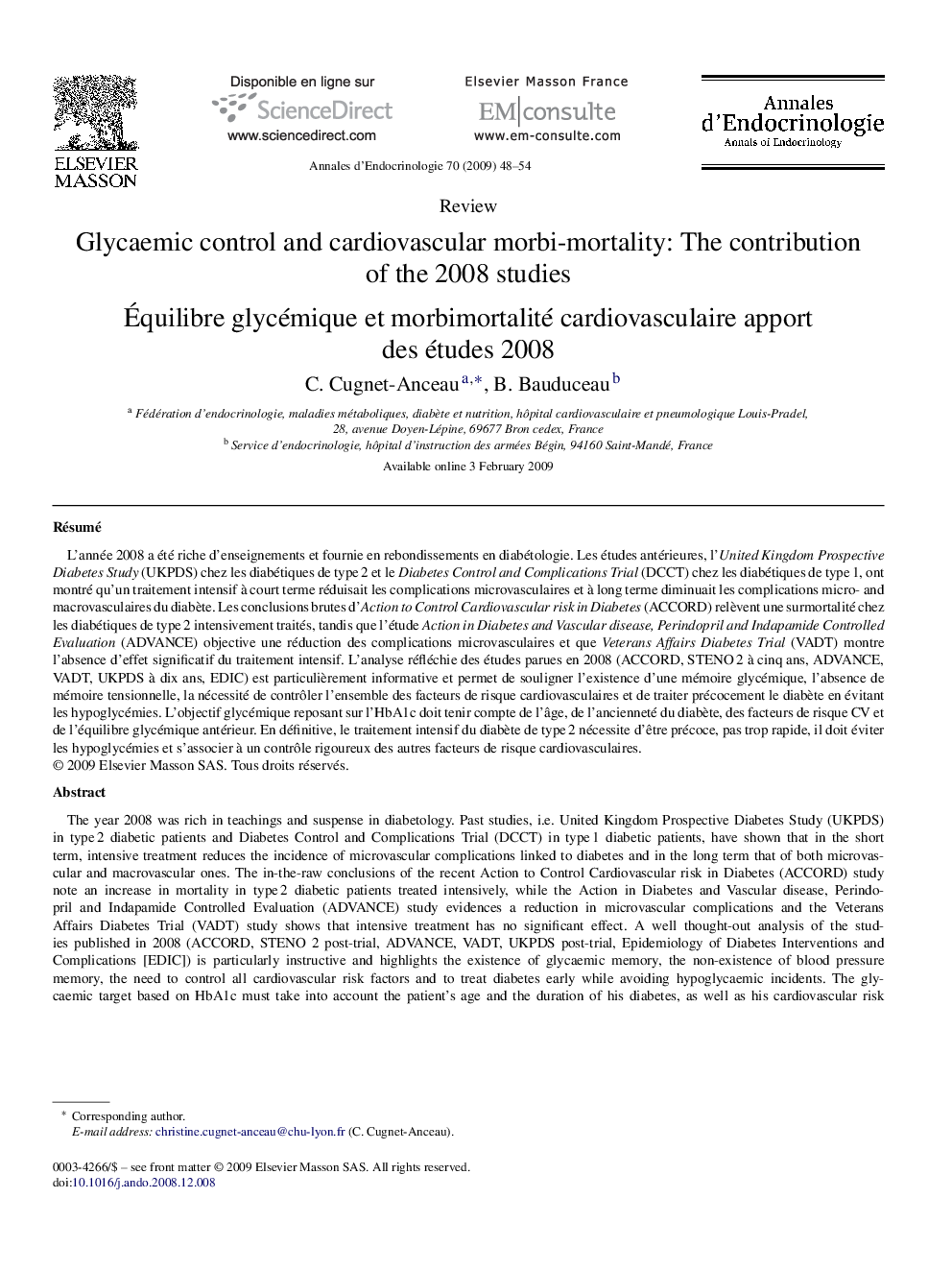| کد مقاله | کد نشریه | سال انتشار | مقاله انگلیسی | نسخه تمام متن |
|---|---|---|---|---|
| 3252935 | 1207089 | 2009 | 7 صفحه PDF | دانلود رایگان |

RésuméL’année 2008 a été riche d’enseignements et fournie en rebondissements en diabétologie. Les études antérieures, l’United Kingdom Prospective Diabetes Study (UKPDS) chez les diabétiques de type 2 et le Diabetes Control and Complications Trial (DCCT) chez les diabétiques de type 1, ont montré qu’un traitement intensif à court terme réduisait les complications microvasculaires et à long terme diminuait les complications micro- and macrovasculaires du diabète. Les conclusions brutes d’Action to Control Cardiovascular risk in Diabetes (ACCORD) relèvent une surmortalité chez les diabétiques de type 2 intensivement traités, tandis que l’étude Action in Diabetes and Vascular disease, Perindopril and Indapamide Controlled Evaluation (ADVANCE) objective une réduction des complications microvasculaires et que Veterans Affairs Diabetes Trial (VADT) montre l’absence d’effet significatif du traitement intensif. L’analyse réfléchie des études parues en 2008 (ACCORD, STENO 2 à cinq ans, ADVANCE, VADT, UKPDS à dix ans, EDIC) est particulièrement informative et permet de souligner l’existence d’une mémoire glycémique, l’absence de mémoire tensionnelle, la nécessité de contrôler l’ensemble des facteurs de risque cardiovasculaires et de traiter précocement le diabète en évitant les hypoglycémies. L’objectif glycémique reposant sur l’HbA1c doit tenir compte de l’âge, de l’ancienneté du diabète, des facteurs de risque CV et de l’équilibre glycémique antérieur. En définitive, le traitement intensif du diabète de type 2 nécessite d’être précoce, pas trop rapide, il doit éviter les hypoglycémies et s’associer à un contrôle rigoureux des autres facteurs de risque cardiovasculaires.
The year 2008 was rich in teachings and suspense in diabetology. Past studies, i.e. United Kingdom Prospective Diabetes Study (UKPDS) in type 2 diabetic patients and Diabetes Control and Complications Trial (DCCT) in type 1 diabetic patients, have shown that in the short term, intensive treatment reduces the incidence of microvascular complications linked to diabetes and in the long term that of both microvascular and macrovascular ones. The in-the-raw conclusions of the recent Action to Control Cardiovascular risk in Diabetes (ACCORD) study note an increase in mortality in type 2 diabetic patients treated intensively, while the Action in Diabetes and Vascular disease, Perindopril and Indapamide Controlled Evaluation (ADVANCE) study evidences a reduction in microvascular complications and the Veterans Affairs Diabetes Trial (VADT) study shows that intensive treatment has no significant effect. A well thought-out analysis of the studies published in 2008 (ACCORD, STENO 2 post-trial, ADVANCE, VADT, UKPDS post-trial, Epidemiology of Diabetes Interventions and Complications [EDIC]) is particularly instructive and highlights the existence of glycaemic memory, the non-existence of blood pressure memory, the need to control all cardiovascular risk factors and to treat diabetes early while avoiding hypoglycaemic incidents. The glycaemic target based on HbA1c must take into account the patient's age and the duration of his diabetes, as well as his cardiovascular risk factors and previous glycaemic control. All in all, the intensive treatment of type 2 diabetes must begin early; it must not be too rapid and must avoid hypoglycaemic incidents and be combined with a strict control of other cardiovascular risk factors.
Journal: Annales d'Endocrinologie - Volume 70, Issue 1, March 2009, Pages 48–54